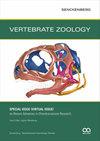Growth pattern of the middle ear in the gray short-tailed opossum, Monodelphis domestica
IF 2.4
2区 生物学
Q1 ZOOLOGY
引用次数: 2
Abstract
We studied the mass growth trajectories of middle ear ossicles and tympanic membrane and oval window area in 19 specimens of postnatal ages 30–180 days of the gray short-tailed opossum Monodelphis domestica. We weighed the skull mass and the mass of the three middle ear ossicles with appropriate balances. Using a binocular microscope provided with a grid, we measured the length of malleus and incus, as well as the longest axis and the one perpendicular to it on both the tympanic membrane and the stapes footplate. The size variation was studied with least squares regression analyses between various measurements. The incus and stapes change little in mass after 40 days of postnatal life, while the malleus does, reaching maximum mass at around 100 PND (postnatal days). This modularity in growth trajectory is in contrast with the shared evolutionary origin of malleus and incus from branchial arch 1. The maturation of the middle – and as indicated by previous work, that of the inner ear – is coupled with the improvement of hearing sensitivity at low and high frequencies after the initial onset of hearing at 29 PND.灰色短尾负鼠(Monodelphis domestica)中耳的生长模式
我们研究了19只出生后30-180天的灰色短尾负鼠的中耳小骨、鼓膜和卵圆窗区域的质量生长轨迹。我们用适当的天平称了头骨和三个中耳小骨的重量。使用带网格的双目显微镜,我们测量了锤骨和砧骨的长度,以及鼓膜和镫骨压板上最长的轴和垂直于它的轴。通过最小二乘回归分析研究了不同测量之间的尺寸变化。出生后40天,砧骨和镫骨的质量变化很小,而锤骨的质量则变化很大,在大约100 PND(出生后几天)时达到最大质量。这种生长轨迹的模块性与来自鳃弓1的锤骨和砧骨的共同进化起源形成了对比。正如先前的工作所表明的,在29 PND首次开始听力后,中耳和内耳的成熟与低频和高频听力敏感性的提高相结合。
本文章由计算机程序翻译,如有差异,请以英文原文为准。
求助全文
约1分钟内获得全文
求助全文
来源期刊

Vertebrate Zoology
ZOOLOGY-
CiteScore
4.00
自引率
19.00%
发文量
42
审稿时长
>12 weeks
期刊介绍:
Research fields covered by VERTEBRATE ZOOLOGY are taxonomy, morphology, anatomy, phylogeny (molecular and morphology-based), historical biogeography, and palaeontology of vertebrates.
 求助内容:
求助内容: 应助结果提醒方式:
应助结果提醒方式:


